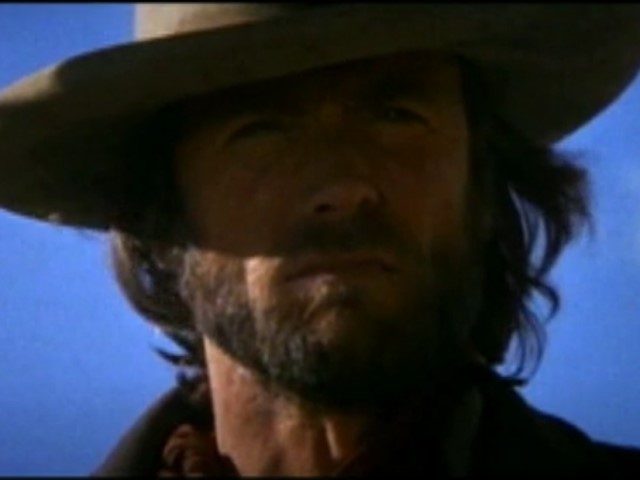Everything about The Outlaw Josey Wales, Clint Eastwood’s 1976 Western masterpiece, would offend today’s Woke Hitler Youth. That alone makes it something worth cherishing and celebrating.
Josey Wales is directed by its star, Clint Eastwood, and when we meet his title character, he’s a family man, a farmer. And then, for no apparent reason (other than they can), a band of pro-Union Jayhawkers (or red legs) burn his home, murder his son, and rape and murder his wife.
With his home and family gone, Josey has no idea what to do with himself. A montage of practice shooting leads us to believe he’s preparing himself for revenge. But when a group of pro-Confederate “bushwhackers” finds him, he’s sitting by his wife and son’s grave looking like a man who’s given up on everything.
So Josey joins the Confederate cause as a guerilla fighter, and after the war’s over, he still refuses to surrender. In his mind, life as a fugitive is preferable to professing loyalty to a government he despises, a government that legitimized those who murdered his family with military commissions. And now, backed by federal authority, those same murderers are under orders to hunt down Wales, this “hard put and desperate man.”
What sounds like, and what some dumb critics at the time wrote off as, Death Wish on the Prairie, is so much more. And it’s so much more primarily due to the very things that would most offend today’s intolerant left.
First off, because of the man who created Josey Wales, novelist Forrest Carter, this project would never get off the ground today. In his home state of Alabama, Carter was a rank segregationist who started his own Ku Klux Klan group and then wrote speeches for George Wallace. But, of course, what that means is that he was a Democrat. But there’s still no way — even though his novel openly rejects these racist views (as I’ll explain below) — that Carter (who died in 1980) would get published today, much less see his book adapted into a studio film.
It should be said that, at the time, neither Eastwood nor anyone associated with the film had any knowledge of Carter’s noxious political beliefs. Nevertheless, Eastwood defended Carter, telling one interviewer he believed Carter had renounced those beliefs and that this was commendable.
Obviously, Carter would never be forgiven in this day and age, so there would be no Outlaw Josey Wales.
The second thing today’s Woketards would never allow is the story’s central theme, which is stridently anti-government. But this is not a “fascist” theme (as the film’s original director, Philip Kaufman, supposedly believed). Quite the opposite. Our protagonist is not running around meting out his own brand of justice or building his own country. Instead, Josey Wales just wants to be left alone. It’s the federal government that makes this impossible, not just for him but for so many others who don’t “fit in.”
Today’s blacklisting woketards would also freak over the movie’s portrayal of the American Indian, specifically in the form of Chief Dan George’s Lone Watie, a wry and funny old man who lusts after the ladies and has the gall to partner with the confederate Wales. I should add that Chief Dan George steals every scene he’s in and delivers more laughs than you can count.
Finally, there’s the theme that would make Woketards apoplectic. In the end, Josey Wales is a movie about Eastwood’s vision of America as a pluralist society of individualists of all races and backgrounds who put aside the past and their difference to live in harmony.
After making peace with Ten Bears, a Comanche chief intent on wiping them out, and doing so (in a stunning scene) based on their mutual revulsion of the backstabbing federal government, Wales has inadvertently created a small society of people from every possible walk of life. A whore, a drunk, an elegant Mexican gentleman, an uptight old lady, a shy young woman, an Indian woman cast out by her own, Lone Watie, and more.
The idea of quirky and determined individualists of all races coming together under the flag of their shared humanity is a theme Eastwood would return to again a few years later in his underrated masterwork Bronco Billy (1980). But here, he’s openly declaring the federal government an impediment to that through a pacifist theme.
“That’s true,” Wales tells Ten Bears (Will Sampson) to avoid the coming slaughter. “I ain’t promising you nothing extra. I’m just giving you life, and you’re giving me life. And I’m saying that men can live together without butchering one another.”
Ten Bears responds:
It’s sad that governments are chiefed by the double tongues. There is iron in your words of death for all Comanche to see, and so there is iron in your words of life. No signed paper can hold the iron. It must come from men. The words of Ten Bears carries the same iron of life and death. It is good that warriors such as we meet in the struggle of life… or death. It shall be life.
The Outlaw Josey Wales was released during the summer of America’s Bicentennial celebration, which was appropriate. I cannot think of a better way — then or now — to remind people that Americanism is what matters, and Americanism is the simple idea of living your own life and allowing the other fella to do the same.
And that’s precisely why there’s no way this classic Western, an almost perfect mix of art and crowd-pleaser, could get produced in a modern left-wing culture empowered through blacklists, division, fake outrage, and a stifling blend of government and corporate fascism.
Follow John Nolte on Twitter @NolteNC. Follow his Facebook Page here.

COMMENTS
Please let us know if you're having issues with commenting.